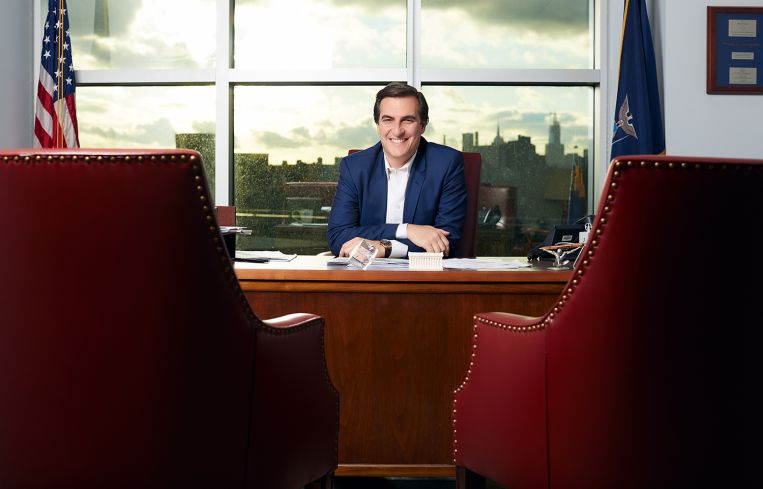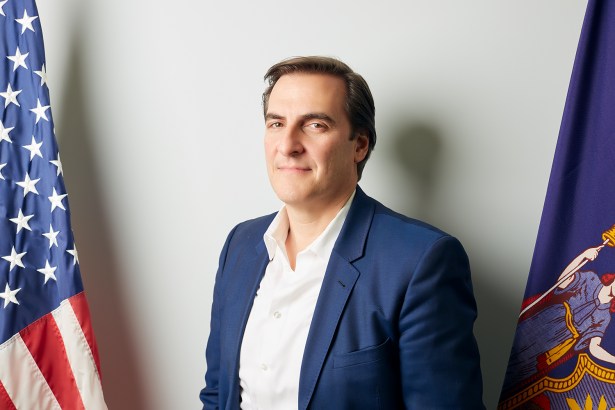Amazon Killer: State Sen. Michael Gianaris on Tax Breaks, Rent Reform and Amazon
New York State Sen. Michael Gianaris is the Queens politician who led the charge against one of the biggest real estate deals in New York City history: Amazon's HQ2.
By Nicholas Rizzi January 28, 2020 9:00 am
reprints
There are few politicians in New York who strike fear in the heart of the real estate community like State Senator Michael Gianaris.
The lawmaker — who represents western Queens — spearheaded a group of elected officials, local groups and residents who banded together to fight Amazon’s plan to build part of its second headquarters in the Long Island City portion of his district, earning Gianaris’ the nickname “Amazon Killer.”
One of the biggest points of contention for the opposition was the $2.5 billion in tax breaks offered to Amazon from the city and state. The Wall Street Journal reported this month the state actually offered $800 million more than that to Amazon.
“I was doing what I believed in,” Gianaris said about the battle. “I didn’t know where it was going to end up, but I was going to fight for my community as hard as I could. And we won the fight, so I’m proud of that.”
Amazon eventually dropped its 4-million-square-foot Long Island City plans in February 2019 and, later that year in December, signed a deal for 335,000 square feet at 410 Tenth Avenue in Manhattan.
Gianaris, who also supported the state’s rent reforms that passed last June, doesn’t seem to be getting on the Real Estate Board of New York’s good side anytime soon.
He recently announced that he’s pushing for changes to the two subsidy programs used by the state to lure Amazon: the Relocation and Employment Assistance Program (REAP), which is set to expire this summer and gives tax breaks to companies that move jobs from outside of New York to certain parts of the city; and the Industrial & Commercial Abatement Program (ICAP), which is set to end in 2022 and gives property tax abatements to companies that build or improve industrial sites around the city.
Gianaris, 49, the son of Greek immigrants, was born and raised in Astoria and graduated from Fordham University with a bachelor’s degree in economics and political science then attended Harvard Law School. He made history in 2000 as the first Greek American to be elected to a New York City office (Dean Skelos was the first in the state) when he was elected to the New York State Assembly and moved to the State Senate in 2011.
Commercial Observer sat down with Gianaris in his Astoria office overlooking the cranes in Long Island City to discuss tax subsidies, his plans for 2020 and, of course, Amazon.

Commercial Observer: Why do you think REAP and ICAP need changes? And what kind of changes are you looking to make?
Michael Gianaris: We learned a lot of lessons from the Amazon debacle. The question is, especially with one of the two expiring this year, can we take the lessons we learned from that and impose some more intelligent guideposts on the ICAP and the REAP programs so that they’re not subject to abuse the way they were?
There should certainly be a cap on access to those programs on a per-project basis. You shouldn’t be able to have one project coming in and getting over a billion dollars of subsidies through these programs as of right. That’s ridiculous. The further you dig into these programs — it’s almost like the Amazon experience allowed us to pull the curtain back and look at other things that are wrong with it — you also see that there are a number of projects that have availed themselves of ICAP specifically where there’s hardly any jobs created from them. Like a lot of self-storage businesses.
There’s a number of things we need to dig into, and we’re currently doing that, to find additional ways to make these programs smarter, more efficient and see the public benefit, not to benefit the private entities that are taking advantage of them.
What do you make of Amazon’s decision to lease office space in Manhattan?
I was always of the opinion — which is why I had the position I did — that Amazon needed New York more than New York needed Amazon. They were smart enough to know that and manipulate the system to extract this massive incentive package from the state and city. But Google is growing 20,000 jobs in New York, Facebook is growing in New York. All of tech is already coming here because this is where the talent pool is that they need. Tech is growing so far, they can’t find the workers fast enough and New York happens to have a huge pool of qualified, skilled workers that the industry needs. Amazon could not afford to allow the competition to seize that talent without also getting their piece of it.
They were coming here and they were always coming here, that’s what we said when everyone was in a panic about them not following through on the Queens project. Now they’ve announced 1,500 jobs within the next year or two and that’s on top of about 1,500 jobs they had already added from a year ago until now. You add those together that’s about 3,000 jobs in the year they announced they were not following through on the Queens project. If you look at the calendar of job growth in the HQ2 plan, we’re actually ahead of pace. It’s my belief that’s … going to continue to happen if we fast forward a decade. You’re going to see those jobs here anyway and you’re going to see it without $3 billion in subsidies and incentives.
The reaction from the real estate community has been that it’s a much smaller office so it’s not as beneficial to New York and it’s not going to create as many ancillary jobs as it would have with a larger headquarters.
Both points hinge on the same thing, which is that they think that’s all the growth there is going to be. The jobs that Amazon has announced in Manhattan and the timeline in which they’re going to be created is faster than what they were promising with HQ2. If anybody thinks that they’re going to stop at those 1,500 jobs, they’re crazy.
You save $3 billion and build the damn thing like a mile away across the river, I’ll take that $3 billion and put it to better use than just having them one river closer than where they might end up anyway. All things being equal, I think things ended up the best way possible for New Yorkers.
What does Long Island City need? What could that $3 billion be used for?
Affordable housing. The housing market is out of control. Everything is luxury housing. The prices are through the roof. It’s tough for people who are not wealthy to afford to live there anymore. What we don’t want to become is a part of New York where you’re either rich or very poor. Queensbridge Houses are right in the middle of Long Island City — and has great needs — and you walk two blocks down the road, you have some of the wealthiest people in New York. We’re trying hard to maintain a place where everyday working people can afford to live and keep their families. We do not want to become a rich person’s playground in Long Island City. The buildings that have been going up along the waterfront, with rare exception, are exacerbating that problem.
Have you seen any developers coming into this district that have been responsive to the community’s needs?
Not a lot, but we’ve had some. I don’t want to jump ahead, our trust is at a premium, but there’s a building owned by Goodwill that had a significant number of affordable units that was just sold. [Astoria’s Goodwill Terrace Apartments was purchased by Jonathan Rose Companies for $35 million this month.] We’ve had conversations with the folks who are coming in who have promised they’re going to maintain the current level of affordability and not kick anyone out. If that is truly what happens in the end, then that’s the kind of more responsible conversation instead of someone razing the place, putting a luxury tower up there and kicking everyone to the curb, which we’ve experienced too much of.

Did the Amazon issue sour your relationship with Gov. Andrew Cuomo [who once joked he would change his name to Amazon Cuomo to lure the company here]?
There are so many issues we deal with on an ongoing basis that we don’t have the luxury of getting personal about it.
I certainly don’t take anything personally in that respect, I just want to get the job done. I don’t think the almost 20 million people in this city give a damn what my relationship with Andrew Cuomo is, so I try and focus on doing what’s best with them, and I’m sure that’s what the governor thinks also.
If you had to be trapped on a desert island with either Cuomo or Mayor Bill de Blasio, who would you pick?
I know my answer but I’m not going to tell you. You could guess, and you’d probably be right.
A lot of politicians, including you, have stopped taking real estate money while fundraising. [REBNY contributed at least $27,800 to Gianaris from 2010 to 2018.] Why did you decide to do that?
[Democrats] took the majority last year; it was my first time in the majority in the Senate. It also happened to be, coincidentally, the year in which the rent laws were up for renewal. And I thought it was important to make a statement that I was going to be motivated solely by protecting the people I represent: predominantly tenants who have been getting the short end for the better part of a couple of decades in New York.
I was always pro-tenant, I always will be, but I didn’t want anyone to perceive or think anything different, so I thought it was important [to say] that the pool that is the largest donor in New York was not something that was going to affect my behavior.
Real estate has been a driving force in New York politics for years. But it seems like it’s becoming a bit of a dirty word for politicians now. Is that true and what are some of the reasons why?
I think I was one of the early ones on that train. Other people can speak for themselves, but there is an increasing realization that the interests of big real estate do not match the interests of working people in this city. And that’s, I think, driving that part of the conversation that you’re talking about, which is the disconnect between the very wealthy masters of the universe and the people who make New York work and run. We haven’t thought enough about that [latter] group, because we’ve been thinking too much about the first one.
Do you think some of it has to do with the fact that New York City real estate figures like Donald Trump and Jared Kushner are in the White House now, or is it just coincidental?
It doesn’t help that perception. We had Jared Kushner in this neighborhood buying buildings, turning them over, kicking people out and selling them. [Kushner Companies purchased three apartment buildings in Astoria at 23-15 30th Ave., 23-05 30th Ave. and 21-80 38th St. and then flipped them for $60 million in 2017, according to QNS.] That was a business model for much of the real estate industry. It happened to be him who was a high-profile figure, but he’s just emblematic of what was going on. Evictions were a part of the business model of the real estate industry for a long time, to the point where the financing was based on how much of a turnover there was in their buildings.
That has led to a real grassroots uprising among tenants who are affected. People who are worried about staying in their homes, people getting evicted, people living in buildings that were not being kept up in a way that people would have homes they can be proud of. That’s really what drove it. Trump and Kushner are just the salsa, as we say in Greek, on top. [A spokeswoman for Kushner declined to comment.]
Why did you and your colleagues feel it was so important to pass rent reform, even with many in the real estate community calling it a disaster?
Evictions are down significantly. That’s the easiest way I can put it. There’s the flip side of what I was just telling you, that the previous iteration of the laws incentivized evictions. We’re seeing, in just a matter of months, that the laws are working because evictions are down.
That’s the benefit for the people in New York, because having a stable home environment is critical to having a stable life and a stable job and getting your kids educated and doing all the things that ultimately lead to greater success for everybody. The fact that we were able to reverse that trend is one of our greatest achievements.
Given the lowered tenant improvement caps, do you have any worries about landlords leaving apartments as-is?
If we see that, we’ll take appropriate action, but there obviously are requirements of habitability that need to be met. I’ve heard more concerns about building-wide improvements, MCIs [major capital improvements]. There’s still a profit margin built into MCIs in the current law.
Anytime dramatic change occurs — which this certainly was — our jobs as legislators is to monitor it, see if any tweaks are needed, see if any changes need to be made. But right now, it seems like everything’s the way it was intended.
Your bill for automatic voter registration [which automatically registers people to vote when they submit applications to the Department of Health and Department of Motor Vehicles] recently passed. Why was that so important to get done?
There’s almost two million New Yorkers who are eligible voters who are not on the roles. It’s as simple as that. There’s a tremendous number of people who are not even able to cast a vote even though they meet all the requirements of voting, which is being 18 years old and a citizen of the United States. What we’re trying to do is maximize everyone’s ability to vote on election day.
What other pieces of legislation are you looking to push through this year?
I would like to see us get across the finish line on marijuana legalization. I think there’s a tremendous amount of untapped tax revenue that we’re losing right now to border states. I understand that 60 percent of Western Massachusetts’ business is coming from New Yorkers. I also think it’s something that people of the state want.
This year is also going to be dominated by the budget deficit that we have [$6.1 billion] and meeting a lot of the needs we have without causing too much pain.
The Sunnyside Yard master plan [a plan to develop a 180-acre rail yard] should be due sometime this year. What are your feelings on what the city is looking to do there?
I’m very concerned because I’ve heard a lot of comparisons to Hudson Yards. For a lot of the same reasons, I’m not looking to have Hudson Yards part two, or even bigger, dropped in the middle of Sunnyside.
As is the case with so many of these proposals, there has not been genuine community engagement in the sense that respects the community. There’s a lot of, “Here’s what we would like to do. Tell us what you like and don’t like about what we are trying to do to you.” As opposed to having a conversation at the outset saying, “What do you think the public need is here? How can we develop a proposal that the community needs and will be happy with?”
The old model should be dead. And if it’s not dead yet, we should be working to make it so. But this notion of, “We need to give the wealthy developers what they need, so they can grace us with the investment that might let us have some crumbs off the table,” is no longer functional.



